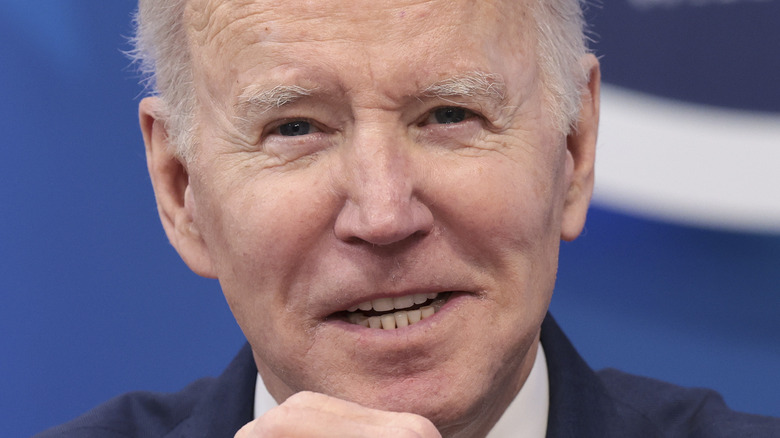What Biden's Executive Order Could Mean For Restaurant Workers
When Wolfgang Puck told Yahoo Finance in June that he was having a hard time finding waiters for his Beverly Hills restaurant — despite the fact they make $120,000 a year, — the news outlet turned his quote into their headline. It's not just Puck who's desperately looking for qualified restaurant staff. ABC News reports that nationwide the culinary industry is bending over backward trying to find staff. In mid-July, Today picked up a story about an entire shift-worth of workers quitting at a Nebraska Burger King at the same time, triumphantly announcing their act of defiance by way of a massive signboard outside the restaurant. According to an op-ed a career waiter wrote for Grub Street, no one should be surprised. It's time to start treating restaurant workers with respect.
Now, President Joe Biden has signed an executive order which might force restaurants into implementing fairer practices. Biden's order contains, per Restaurant Business Online, 72 different initiatives. One, in particular, has the power to dramatically change the restaurant industry's hiring practices by calling on the FTC to limit or abolish non-compete and anti-poaching provisions. That's not small fish.
Why Biden's executive order could lead to higher wages and better working conditions in the culinary world
It's not the first time that public officials have taken aim at non-compete and anti-poaching provisions. In 2018 the Washington State Attorney General's Office announced that to avoid a lawsuit, seven corporations had agreed to remove non-poach provisions from their contracts, including Arby's, Cinnabon, and McDonald's. Three years ago, The Washington Post reported that a staggering 80% of fast-food workers had non-poaching clauses attached to their contracts. Now, The Counter's investigation suggests that up to one in six restaurant workers are covered by non-compete clauses. Both such clauses have the power to keep food industry wages low, and labor conditions sub-par. "For non-unionized workers, which are the vast majority of workers in this sector, the only source of economic leverage they have with respect to their employers is their implicit ability to quit their job and go find a better one," Economic Policy Institute economist Heidi Shierholz explained to the media outlet.
Biden hopes that his executive order will give restaurant workers bargaining power they deserve. "If your employer wants to keep you, he or she should have to make it worth your while to stay. That's the kind of competition that leads to better wages and greater dignity of work," the president explained upon signing it (via Food & Wine). Changes to industry hiring policies, however, won't be immediate. According to The Washington Post, the federal agencies tasked with revising policies may take three to fourth months to implement new ones.

